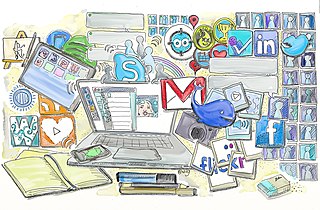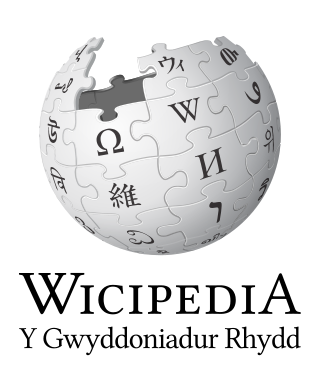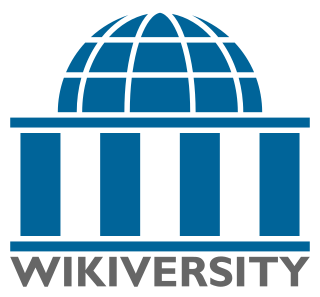Related Research Articles
This article provides an overview of education in Wales from early childhood to university and adult skills. Largely state funded and free-at-the-point-of-use at a primary and secondary level, education is compulsory for children in Wales aged five to sixteen years old. It differs to some extent in structure and content to other parts of the United Kingdom, in the later case particularly in relation to the teaching of the Welsh language.
Moodle is a free and open-source learning management system written in PHP and distributed under the GNU General Public License. Moodle is used for blended learning, distance education, flipped classroom and other online learning projects in schools, universities, workplaces and other sectors.
Social bookmarking is an online service which allows users to add, annotate, edit, and share bookmarks of web documents. Many online bookmark management services have launched since 1996; Delicious, founded in 2003, popularized the terms "social bookmarking" and "tagging". Tagging is a significant feature of social bookmarking systems, allowing users to organize their bookmarks and develop shared vocabularies known as folksonomies.

Open educational resources (OER) are teaching, learning, and research materials intentionally created and licensed to be free for the end user to own, share, and in most cases, modify. The term "OER" describes publicly accessible materials and resources for any user to use, re-mix, improve, and redistribute under some licenses. These are designed to reduce accessibility barriers by implementing best practices in teaching and to be adapted for local unique contexts.
Educational technology is the combined use of computer hardware, software, and educational theory and practice to facilitate learning. When referred to with its abbreviation, "EdTech," it often refers to the industry of companies that create educational technology. In EdTech Inc.: Selling, Automating and Globalizing Higher Education in the Digital Age, Tanner Mirrlees and Shahid Alvi (2019) argue "EdTech is no exception to industry ownership and market rules" and "define the EdTech industries as all the privately owned companies currently involved in the financing, production and distribution of commercial hardware, software, cultural goods, services and platforms for the educational market with the goal of turning a profit. Many of these companies are US-based and rapidly expanding into educational markets across North America, and increasingly growing all over the world."

A social networking service or SNS is a type of online social media platform which people use to build social networks or social relationships with other people who share similar personal or career content, interests, activities, backgrounds or real-life connections.

The Canadian Heritage Information Network is a special operating agency within the federal Department of Canadian Heritage that provides a networked interface to Canada's heritage institutions. It is based in Gatineau, Quebec, and is administratively merged with the Canadian Conservation Institute (CCI), another special operating agency of Canadian Heritage.
Welsh Labour, formerly known as the Labour Party in Wales, is an autonomous section of the United Kingdom Labour Party in Wales and the largest party in modern Welsh politics. Welsh Labour and its forebears have won a plurality of the Welsh vote at every UK general election since 1922, every Assembly and Senedd election since 1999, and all elections to the European Parliament in the period 1979–2004 and in 2014. Welsh Labour holds 22 of the 40 Welsh seats in the UK Parliament, 30 of the 60 seats in the Welsh Senedd and 576 of the 1,264 councillors in principal local authorities including overall control of 10 of the 22 principal local authorities.

The London Grid for Learning commonly referred to as LGfL is a British not for profit technology company with headquarters in central London. The charity founded in 2001 procures, develops and delivers technology and educational content including broadband connections, filtering and safeguarding services, devices and software and licences. LGfL started in London but is now a nationwide organisation winning multiple awards such as ERA Education Supplier of the Year.
The Association of Science and Technology Centers (ASTC) is a non-profit, global organization based in Washington, D.C., in the United States, that provides professional support for science centers, museums, and related institutions. ASTC's goal is to increase awareness of the contributions its members make to their communities and the field of informal STEM learning.
A travel website is a website that provides travel reviews, trip fares, or a combination of both. Over 1.5 billion people book travel per year, 70% of which is done online.
Participatory culture, an opposing concept to consumer culture, is a culture in which private individuals do not act as consumers only, but also as contributors or producers (prosumers). The term is most often applied to the production or creation of some type of published media.

The Welsh Wikipedia is the Welsh-language edition of Wikipedia. This edition was started in July 2003. On 23 June 2007, it reached 10,000 articles, the 66th Wikipedia to do so. On 20 November 2008, it attained 20,000 articles. Less than a year later, on 28 October 2009, it reached 25,000 articles. In July 2013 it reached 50,000 articles and is now the 41st largest Wikipedia edition. It is the only internet resource of its kind in Welsh and has an average of 2.7 million hits every month, making it the most popular Welsh language website. It, therefore, has an important place in Welsh language online culture.

A hackerspace is a community-operated, often "not for profit", workspace where people with common interests, such as computers, machining, technology, science, digital art, or electronic art, can meet, socialize, and collaborate. Hackerspaces are comparable to other community-operated spaces with similar aims and mechanisms such as Fab Lab, men's sheds, and commercial "for-profit" companies.

Wikiversity is a Wikimedia Foundation project that supports learning communities, their learning materials, and resulting activities. It differs from Wikipedia in that it offers tutorials and other materials for the fostering of learning, rather than an encyclopedia. It is available in many languages.
Social learning tools are tools used for pedagogical and andragogical purposes that utilize social software and/or social media in order to facilitate learning through interactions between individuals and systems. The idea of setting up "social learning tools" is to make education more convenient and widespread. It also allows an interaction between users and/or the software which can bring a different aspect to learning. People can acquire knowledge by distance learning tools, for instance, Facebook, Twitter, Khan Academy and so on. Social learning tools may mediate in formal or informal learning environments to help create connections between learners, instructors and information. These connections form dynamic knowledge networks. Social learning tools are used in schools for teaching/learning and in businesses for training. Within a school environment, the use of social learning tools can affect not only the user (student) but his/her caretaker as well as his/her instructor. It brings a different approach to the traditional way of learning which affects the student and his/her support circle. Companies also use social learning tools. They used them to improve knowledge transfer within departments and across teams. Businesses use a variety of these tools to create a social learning environment. They are also used in company settings to help improve team work, problem solving, and performance in stressful situations.
The JISC Digitisation Programme was a series of projects to digitise the cultural heritage and scholarly materials in universities, libraries, museums, archives, and other cultural memory organizations in the United Kingdom, from 2004 to 2010 The program was managed by the UK's Joint Information Systems Committee, the body that supports United Kingdom post-16 and higher education and research in support of learning, teaching, research and administration in the context of ICT.
The National Curriculum was first introduced in Wales as part of the Education Reform Act 1988, alongside the equivalent curriculum for England. Following devolution in 1999, education became a matter for the Welsh Government. Consequently, some elements of the system began to differ from England. This article covers the curriculum as it existed from 2008 until the formal introduction of a new Curriculum for Wales between 2022 and 2026.
Google Classroom is a free blended learning platform developed by Google for educational institutions that aims to simplify creating, distributing, and grading assignments. The primary purpose of Google Classroom is to streamline the process of sharing files between teachers and students. As of 2021, approximately 150 million users use Google Classroom.
Social media in education is the practice of using social media platforms or technology to enhance the education of students. Social media is defined as "a group of Internet-based applications that build on the ideological and technological foundations of Web 2.0, and that allow the creation and exchange of user-generated content". Social media platforms can be used as a means of completing assignments or projects electronically. These activities can grant students opportunities to develop skills with computers and online platforms.
References
- ↑ "'Find it, Make it, Use it, Share it' pdf on Welsh Govt Website" (PDF). Archived from the original (PDF) on 2012-08-17. Retrieved 2015-01-31.
- ↑ "About the project on the Hwb site". Archived from the original on 2015-01-31. Retrieved 2015-01-31.